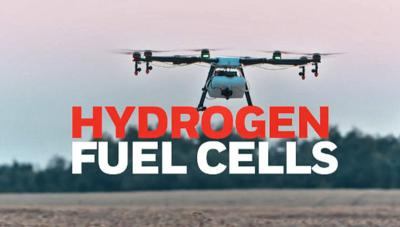Joint Effort Explores H2 Drone and Aircraft Powertrains
A new partnership between Worcester Polytechnic Institute (WPI) and Honeywell Aerospace aims to reduce the aviation industry’s carbon footprint by examining means by which hydrogen fuel-cells may be utilized to power future generations of aircraft.

Announced on 22 March 2023, the collaboration focuses on hydrogen storage and power generation technology germane to all forms of air travel, including Unmanned Aerial Vehicles (UAV), passenger travel, and cargo transport.
Honeywell, which is supplying hydrogen equipment and technological expertise, has occupied lab space in WPI’s Goddard Hall and offices in Gateway Park, thereby establishing a significant presence on the institution’s campus.
WPI project lead and assistant professor of Chemical Engineering Andrew Teixeira stated: “The aviation industry has recognized an imperative to decarbonize, which is extremely challenging in the weight and volume constrained environment of an aircraft. Hydrogen, along with Sustainable Aviation Fuels and aircraft electrification, represents a huge opportunity for the aerospace industry to meet the UN’s 2050 climate targets.”
Professor Teixeira added: “The collaboration with Honeywell will accelerate the process because the partnership permits WPI researchers to focus on the scientific bottlenecks while Honeywell provides leading expertise on aerospace productization and certification. The combination of expertise that spans technology readiness from pure research all the way to shipping product, all in one location, enhances our ability to move and iterate fast and make a real difference to the aviation industry.”
Through the new collaborative effort—which is to be carried out under the provisions of a multiyear contract to develop hydrogen storage and fuel-cell technologies—a group of roughly 25 Honeywell team members will work together with WPI faculty and students. Honeywell is currently utilizing the aforementioned technologies to power unmanned aerial vehicles. Moving forward, the Honeywell-WPI team will investigate the applications of hydrogen powertrain solutions to unmanned aerial vehicles, cargo drones, air taxis, and even larger aircraft. The Honeywell-WPI team posits that, one day, commuter and regional aircraft may be powered by hydrogen fuel-cells, thereby obviating petroleum fuels.
In 2019, the aviation sector accounted for 2.8-percent of global CO2 emissions; the antecedent percentage is projected to grow, however, as other energy-intensive industries move to decarbonize and air-travel continues to expand.
Honeywell Aerospace senior director of zero emissions aviation Phil Robinson set forth: “Honeywell has technology on virtually every commercial flight, from engines and APUs to avionics, environmental control, and other aircraft systems. For the past several years we’ve ramped up our exploration of hydrogen solutions—both combustion and fuel cells—as well as other ready-now technologies that help our customers create a more sustainable future.

Mr. Robinson continued: The unique talent pool and opportunity for collaboration drove Honeywell’s choice to work with WPI, and we’ve been very pleased with our interactions with WPI faculty, staff, and students alike. We’re excited to bring unique clean technologies to our aviation customers, and also help guide WPI research in as-of-yet unexplored areas.”
The collaboration with Honeywell affords WPI students opportunity to share laboratory space and work side-by-side with Honeywell’s field-leading experts. What’s more, the agreement funds three Ph.D. students over several years as well as numerous undergraduate major qualifying projects annually. Principal investigators include chemical engineers Andrew Teixeira and Anthony Dixon and chemists Ronald Grimm and Shawn Burdette.
 ANN's Daily Aero-Term (05.02.24): Touchdown Zone Lighting
ANN's Daily Aero-Term (05.02.24): Touchdown Zone Lighting Aero-News: Quote of the Day (05.02.24)
Aero-News: Quote of the Day (05.02.24) Aero-News: Quote of the Day (05.03.24)
Aero-News: Quote of the Day (05.03.24) ANN's Daily Aero-Term (05.03.24): UAS Traffic Management (UTM)
ANN's Daily Aero-Term (05.03.24): UAS Traffic Management (UTM) ANN's Daily Aero-Linx (05.03.24)
ANN's Daily Aero-Linx (05.03.24)




